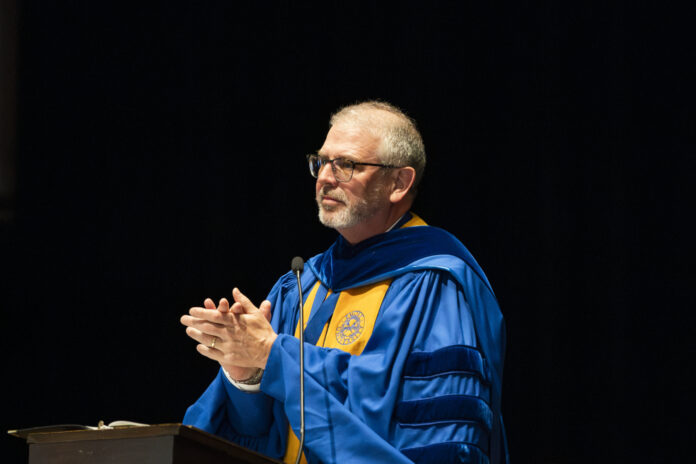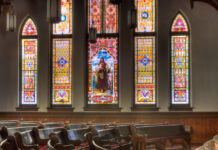All the great religions teach that suffering is a part of life. Their warning, however, is not really necessary. Anyone who has lived very long or loved very much already knows the inescapable reality of suffering and pain that comes to us all.
This dark truth has cast its shadow over us this past week in the untimely death of our dear friend and colleague, Scott Davis. Dr. D. Scott Davis came to Mercer University as an assistant professor of chemistry on Sept. 1, 1991, at the age of 28. He immediately began building an impressive academic career, earning the respect of his colleagues and the admiration of his students. Administrative talents began to emerge alongside his academic gifts.
In 2012, President William D. Underwood asked Scott to become University provost. Scott accepted the invitation, and, in that role, he distinguished himself as a key leader within our institution and a true force of nature, navigating a steady stream of difficult challenges with wisdom, honesty and fairness. With an unwavering passion for Mercer, Scott tirelessly put what was best for all of us ahead of what was good for any of us. In great measure, we are the university we are today because of the life and work of D. Scott Davis. The loss to his family, his friends, the University and the wider circle of his colleagues is an open and painful wound that will not heal quickly.
There is no questioning the reality of suffering. The gnawing question is what we do with it, and what we allow it to do with us.
I have a friend (I will call him John) who, years ago, was on a research trip in the Middle East. Suddenly, out of nowhere, he received the devastating news that his son had been killed in an automobile accident. Heartbroken, he flew home to be with his family. As he sat in silence on the long flight home, he wondered how he could possibly carry the staggering weight of this pain that was crushing him.
Somewhere over the ocean, as he later recounted to me, he came upon the idea of being a steward of his pain. He imagined the possibility of holding his pain in a way that might turn him toward the light rather than leaving him abandoned in the darkness. For the sake of his own life and to honor his son’s, John began to explore what it would mean to be a good steward of his pain.
Leaning on the insights of Frederick Buechner’s memoir, The Sacred Journey, John knew that he must be honest about his pain. He could not ignore it, bury it somewhere inside of himself and pretend it wasn’t there. Being a good steward of our pain demands that we face it fully and honestly. Living in denial of a cancerous tumor in our body or cancerous suffering in our soul will never bring us to healing. Seeing our brokenness, naming it and accepting it is the only way toward wholeness.
Being honest about our pain requires we recognize it is a real part of our life, but it also means we recognize that this pain is not our whole life. There is still much good in the world to be experienced and enjoyed. Even with the greatest losses, there will still be laughter and sunsets, close family and friends, beautiful music and delightful silence, great causes to care about and bold adventures to take.
Being honest about our pain means being neither oblivious to it nor overwhelmed by it. We find ways of being true to ourselves, what we have lost and what we have kept.
Choosing to be a good steward of our pain, integrating it into the new journey that we are on, means that we let our pain lead us into brighter light and deeper love. Pain can be our best teacher. Whenever something is lost — our health, a relationship, a dream — we are able to see in a clearer light what still remains and is most important to us. Suffering, if we allow it, can be a wise teacher, guiding us toward our best life and away from cluttered lives that are filled with so much that really doesn’t matter. We need to listen to our broken and empty hearts; they have much to show us.
Finally, choosing to be a good steward of our pain can also lead us to discover the richness of love, waiting in the outstretched hands and open hearts that are ready to hold us. Those beloved family and friends have likely been there all along, but we were too distracted to notice. When suffering comes, however, and our world crashes to a screeching halt, we are surprisingly aware of the sincere and unselfish love, poured out on us. Discovering that love is a priceless gift.
And so, as we grieve the loss of Scott, may we be good stewards of our pain, letting it lead us toward our best of life. That’s what Scott would surely want for us all.
A memorial service will be held on Feb. 19 at 2 p.m. in Willingham Hall’s Toney Auditorium on the Macon campus. A livestream will also be available for those who cannot attend the campus service. The link for the livestream is https://go.mercer.edu/scottdavis.










